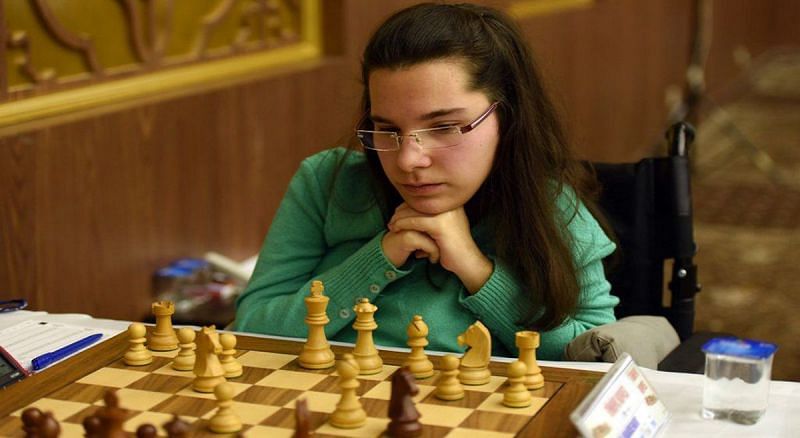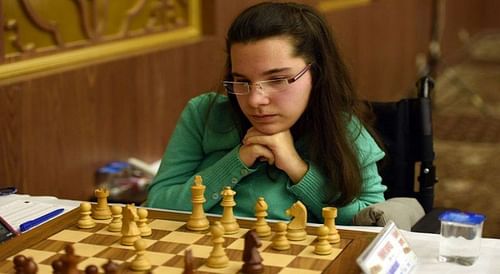
Chess beyond boundaries: In conversation with Handenur Şahin

Handenur Şahin is a chess player, motivational speaker and change-maker. The 23-year-old, who was born with spinal muscular atrophy, has been playing chess for 13 years and has won several accolades in the sport.
She will be competing for the Turkish National Team in the Online ParaOlympiad later this year. In this exclusive interview, we find out more about her chess career, her education, her change-making efforts, and more.
1. Can you please introduce yourself for us and share a bit about your background?
Handenur Şahin: I am 23 years old. I live in İstanbul, Turkey. I am an SMA patient, a muscular disease. We saw its symptoms in my early childhood. I have been using the wheelchair since I was nearly four. I graduated as the valedictorian from my primary and high school. And then, I went to the Galatasaray University, which is one of the most reputable universities in Turkey, and I just graduated earlier this summer.
Besides, I have been playing chess for 13 years. Now, I am one of the best women players in Turkey and hold one of the highest spots in the world rankings for females with disabilities.
2. How did you get involved in chess? What were some of the early memories that you have from your career?
Handenur Şahin: I started to play chess when I was 10 in primary school. One of my teachers, who was interested in chess, convinced my family to join the chess courses in the school. Within a short time, I was selected for the school chess team and started to participate in tournaments.
In my first event, I stood 6th. After that, me and my family decided that I should continue playing chess. When I was 12, I competed in the Turkish Youth Chess Championship for the first time. Since then, my journey in chess has continued to progress.
3. How did chess help you deal with the difficulties that you might have faced with your disability?
Handenur Şahin: I have a serious muscular disease, which causes early deaths for some with the disease. Actually, before chess, I felt more vulnerable but the game showed me how strong I was. It only makes me stronger.
In chess, we win a lot of games but we lose a lot as well. I grew up with chess because I have been playing it since my childhood. It taught me not to give up immediately when I lose. And it makes me more stubborn about my goals. I learned that for anything I would like to do, I should work and if necessary, grind much more than others.
4. Can you talk about an experience that stands out to you in your chess career?
Handenur Şahin: In 2014, I won the 5th prize in the European Schools Chess Championship. There, for the first time, I achieved a medal on behalf of the national team. I cannot forget my feelings in the medal ceremony of this tournament. It was so special for me.
In 2015 as well as in 2019, I became the women's champion in the Turkish Universities Chess Championship. I was the first winner from my university in chess. In 2018, I gained the 3rd prize in the Turkish Women Chess Championship and was awarded with the Sportswoman of the Year prize. These achievements have been motivating me to progress further.
5. You are a stellar student as well. How did you manage to accomplish both playing chess as well as studying?
Handenur Şahin: Yes, it’s exactly the most difficult part. To accomplish on both the sides, you are required to be organised and to plan very well. Sometimes. I stay away from my lessons for maybe two weeks, and it can be a problem when I turn back.
Generally, I studied hard when I returned home instead of resting. However, I could adjust it within a few days and after that, I continue with my lessons as always. I should say that my friends at the university have always helped me on this matter, especially for the lessons that I could not join due to the tournaments.
6. You have an interest in political science and development. Can you talk about this and also your work experience at an international non-profit?
Handenur Şahin: Yes, since my childhood, I was interested in political issues. In the university, I chose this department and I realised that I really enjoy learning more about deep political theories and their applications in the current domestic and international politics of the countries.
I am also interested in political history because it is easier to understand the current issues if you know similar issues of the past. This year, I hope I will begin my master's degree in the field of Political Science and International Relations.
As for my work experience, I have worked as an intern in the Sabancı Foundation, one of the most reputable civil society institutions in Turkey. This foundation works for the development of women, disabled people and the youth. Besides, I have just completed another internship at the Istanbul Policy Center, one of most prominent political think-tanks in Turkey.
7. You recently also organised an event to benefit the disabled chess community. What was this event about?
Handenur Şahin: Two of my friends, Turgay Seçkin Serpil (advocate and FIDE Disabled Committee Member), Ali Polatel (programmer), and I founded an organisation, a movement for disabled chess players just one year ago called Chess Without Boundaries. Seçkin is also the writer of the book entitled “Education Methodology for the Visually Handicapped: A Guide For Trainers.”
We met in the 1st FIDE Confederation Cup for Disabled People in Ankara. This tournament was the first one with disabled players for me. It was so special this way because for the first time, I met chess players who were dealing with physical problems, such as me.
Despite those issues, all competitors played in the competition without any problem. Actually, it was like the Paralympic games. All the players had their physical differences, some were visually handicapped, some were using the wheelchair, etc. Our common point was our spirit of fighting. So, chess brought us together.
As the Chess Without Boundaries team, we decided to do more for disabled people and the game. Our main goal is to make all chess materials (educational ones or others) and tournaments accessible for all disabled people. We have organised a tournament among Turkish chess players with disabilities during the pandemic. We held it online. After that, we conducted friendly games online between the disabled National team of Vietnam and Turkey.
In November 2020, I will be participating in the FIDE Online ParaOlympiad for the Turkish National team.
8. Where do you see yourself in the near future?
Handenur Şahin: Actually, I would like to improve myself as much as possible in chess. My main goal is to become a Woman Grand Master (WGM), and I believe that I can do it within the next few years.
For my professional life, I should say that I have not yet decided exactly but I would like to become a policy analyst, to work on humanitarian affairs and for human rights. My dream position is at the UN Human Rights Institutions.
In the end, the thing that drives me is to be a role model for disabled people, to specially inspire disabled children about their lives.
9. What advice could you give to our readers about achieving goals in their lives despite facing setbacks and disappointments?
Handenur Şahin: All of us have some setbacks in our lives, physical or others. I think the most important thing is to believe in our potential. I know that nothing is impossible. However, it requires us to be stubborn about our goals. To give up is so simple, but we should deal with our 'handicaps'.
If we want to achieve something, we should work for it, generally more than the others. I can say the same thing for disabled people.